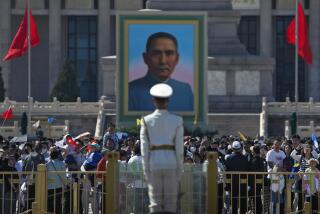Key Reformer Facing Trial in Beijing Protests : China: The result in the Bao Tong case will be an indicator of the nation’s political climate.
- Share via
BEIJING — China’s most important political trial in more than a decade is expected to begin soon, with a key reformer facing charges stemming from the 1989 Tian An Men Square pro-democracy protests.
Bao Tong, 58, former right-hand man to ousted Communist Party General Secretary Zhao Ziyang, faces charges of “counterrevolutionary incitement” and “divulging state secrets.”
Since political trials in China are held for their effect, not for the pursuit of justice, an outcome presumably has been predetermined, even though it is not yet publicly known. The results may affect the choice of an ultimate successor to senior leader Deng Xiaoping, 87. The trial also will give some indication of whether authorities intend to relax the current severe level of political repression here.
Although never a member of the policy-setting Politburo, Bao was deeply involved in its work as the political secretary of that body’s Standing Committee, beginning in late 1987. He also headed the Communist Party’s Research Center for Political Structural Reform. From these positions, he was a powerful advocate of more democratic procedures within the Communist Party.
Bao is by far the most important leader to face trial in China since the sensational 1980-81 show trial of the Cultural Revolution leaders known as the Gang of Four, who included Chairman Mao Tse-tung’s widow, Jiang Qing.
Bao’s family was informed July 4 that he would soon face trial, according to his son, Bao Pu, a graduate student in computer engineering at the New Jersey Institute of Technology in Newark, who spoke in a telephone interview. “We only know that it can start any time after the seven-day advance notice period,” Bao Pu said.
Zhao was ousted from effective power around May 18, 1989, two days before martial law was declared in Beijing in a hard-line attempt to end the protests that had engulfed the city. Bao was arrested in late May, a week before army troops shot their way into Beijing to suppress the demonstrations. About 1,000 people were killed in the crackdown, according to Western intelligence estimates.
Bao was subsequently accused of passing information about Politburo meetings--especially the decision to impose martial law--to student leaders.
There are several possible reasons for the trial.
For hard-liners in the Communist Party and government leadership, trying Bao is a way to attack his mentor, Zhao, 73, whose accomplishments and prestige are so great that formally accusing him of crimes has proven impossible. If Bao is given a lengthy sentence, that might help ensure that Zhao, who has spent the last three years under a mild form of house arrest, does not stage a political comeback.
The trial will be taking place at a time when reformers are on the offensive in China, with leaders who once were very close to Bao and Zhao seeming to be in the ascendancy. These leaders may be prepared to sacrifice Bao as a scapegoat, as part of a trade-off with hard-line rivals that could allow the country to get on with its economic reform program.
But the government might use the trial as a way to release Bao, convicting him but sentencing him to time already served or a little more. This outcome would be a signal that political repression will be eased as part of the overall reform effort.
An acquittal is virtually impossible. Conviction appears to be an essential part of an attempt by authorities to justify the 1989 massacre that ended the protests. The government has claimed that an anti-government conspiracy required use of lethal force.
Bao Pu said he believes that his father is being targeted in retaliation for his attempts to push political reform during the late 1980s.
His father and others proposed “separating the party and the government,” Bao Pu said. They urged “a fair and equitable government personnel policy” and “democratic procedures within the party, the government and throughout the country.”
More to Read
Sign up for Essential California
The most important California stories and recommendations in your inbox every morning.
You may occasionally receive promotional content from the Los Angeles Times.













